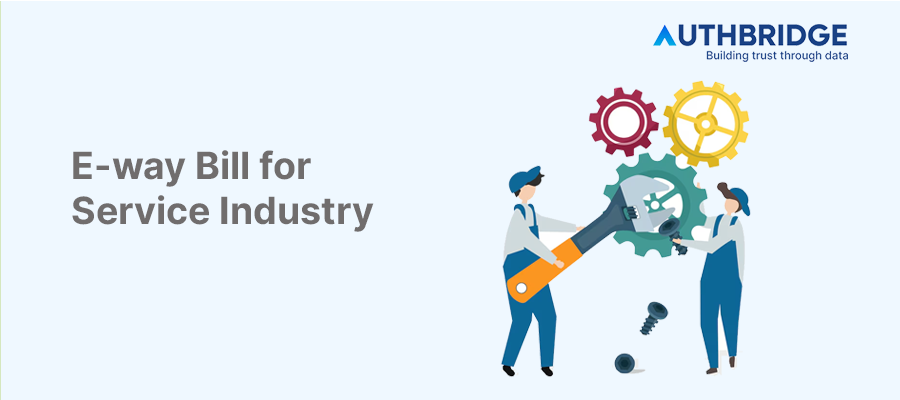Guidelines & Best Practices

The E-way Bill system, primarily designed for tracking the movement of goods under the GST regime, also finds applicability in the service industry under specific circumstances. Understanding when and how E-way Bills apply to services is crucial for compliance and avoiding penalties.
Distinction Between Goods and Services in E-way Bill Generation
While E-way Bills are predominantly associated with the physical movement of goods, certain service transactions that involve the movement of goods as part of service delivery may require E-way Bill generation. Distinguishing these scenarios is essential for service providers.
E-way Bill Applicability to the Service Industry
General Guidelines and Exceptions
The general rule is that E-way Bills are not required for the supply of services. However, exceptions exist, such as when services involve the transfer of goods either as a part of service delivery or as a principal supply itself.
Specific Cases Where E-way Bills are Required for Services
- Transportation Services: Where the service involves the transportation of goods.
- Works Contract Services: Involving the transfer of goods as part of contract execution.
Generating E-way Bills for Service-Related Movements
Step-by-Step Process
- Identify the Need: Determine if the service transaction involves the movement of goods requiring an E-way Bill.
- Gather Information: Collect all necessary details, including consignor, consignee, transporter, and goods details.
- Generate E-way Bill: Use the GST portal or integrated solutions for E-way Bill generation.
Documentation and Information Requirements
Documentation varies based on the service but generally includes contracts, invoices, and transport documents detailing the goods involved in the service delivery.
Challenges and Solutions in Implementing E-way Bills for Services
Common Compliance Issues
Service providers often face challenges in identifying transactions requiring E-way Bills and managing the associated documentation.
Strategies for Effective Management
- Compliance Training: Educate staff on E-way Bill requirements.
- Technology Use: Leverage software solutions for E-way Bill management.
Legal Framework and Regulatory Insights
GST Council Updates and Notifications
The GST Council periodically reviews and updates E-way Bill requirements. For instance, adjustments to the value threshold or exemptions for certain goods or services can directly impact the service industry's compliance obligations.
Interpretations and Rulings Impacting the Service Industry
Legal interpretations and court rulings provide clarity on ambiguous aspects of E-way Bill regulations. For example, a ruling that clarifies the applicability of E-way Bills for specific types of service transactions can significantly affect compliance strategies.
FAQs and Expert Guidance
To further assist service providers in navigating E-way Bill requirements, here are some FAQs and expert tips:
Addressing Common Queries
- Q: Can E-way Bills be generated for backdated transactions?
- A: No, E-way Bills must be generated before the commencement of goods movement. Backdated E-way Bills are not permissible and can lead to penalties.
- Q: What should a service provider do if the goods are rejected and returned by the customer?
- A: For goods returns, a new E-way Bill should be generated based on the return invoice, ensuring that the return movement complies with E-way Bill regulations.
Tips for Effective E-way Bill Management for Services
- Regular Training: Conduct regular training sessions for your team on the latest E-way Bill procedures and best practices.
- Use Reliable Software: Invest in reliable GST and E-way Bill management software that can integrate with your existing systems for seamless compliance.
- Consult with Experts: When in doubt, consult with GST experts or legal advisors to navigate complex compliance scenarios.
Conclusion
For service providers, navigating the complexities of E-way Bill compliance requires a proactive approach, leveraging technology, and staying informed about regulatory changes. By understanding the nuances of E-way Bill applicability to services, implementing best practices, and utilizing available resources, businesses can ensure compliance, avoid penalties, and maintain operational efficiency.
Category

Abhinandan Banerjee
(Associate Manager - Marketing)
Abhinandan is a dynamic Product and Content Marketer, boasting over seven years of experience in crafting impactful marketing strategies across diverse environments. Known for his strategic insights, he propels digital growth and boosts brand visibility by transforming complex ideas into compelling content that inspires action.



